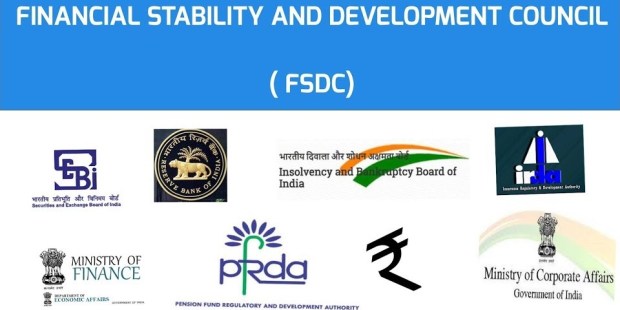Union Finance Minister chairs the 27th Meeting of Financial Stability and Development Council (FSDC):
On May 11, 2023, Union Finance Minister Smt. Nirmala Sitharaman chaired the 27th meeting of the Financial Stability and Development Council (FSDC) in New Delhi. This was the first meeting held after the announcement of the Budget 2023-24. The council discussed the policy and legislative reform measures needed to develop the financial sector further and increase financial access for the people.
Buy Prime Test Series for all Banking, SSC, Insurance & other exams

Regulators advised to ensure financial sector stability:
During the meeting, the Union Finance Minister emphasized that ensuring financial sector stability is a shared responsibility of regulators. She advised the regulators to maintain a constant vigil and take timely action to mitigate any vulnerability and strengthen financial stability. The regulators were also advised to reduce the compliance burden further and ensure a streamlined and efficient regulatory environment. The Union Finance Minister will review the progress achieved in this regard with each regulator in June 2023.
Regulators urged to ensure cyber-security preparedness:
Smt. Sitharaman also urged the regulators to ensure the cyber-security preparedness of the information technology systems to reduce the risk of cyber-attacks, protect sensitive financial data, and maintain overall system integrity. This will safeguard the stability and resilience of the Indian financial ecosystem.
Special drive to facilitate settlement of unclaimed deposits and claims:
The regulators were also asked to conduct a special drive to facilitate the settlement of unclaimed deposits and claims in the financial sector across all segments, such as banking deposits, shares and dividends, mutual funds, insurance, etc.
Implementation of Budget announcements discussed:
The Council discussed the action taken report on the budget announcements made since 2019. The regulators were advised to adopt a focused approach to implement the announcements made in the Budget 2023-24, and timelines were decided for the same.
Deliberations on various financial topics:
Apart from the above, the Council also deliberated on various topics, such as Early Warning Indicators for the economy and our preparedness to deal with them, Reducing Compliance Burden on the regulated entities in the financial sector by Improving Regulatory Quality, Debt Levels of Corporates and Households in India, Simplification and Streamlining of KYC Framework to meet the needs of Digital India, Seamless Experience for Retail Investors in Government Securities, Bimakrit Bharat – Unique Value Proposition to take insurance to last mile, and support required in terms of resolving inter-regulatory issues for GIFT IFSC to play a strategic role in Atmanirbhar Bharat.
FSDC Sub-Committee activities and past decisions:
The Council also took note of the activities undertaken by the FSDC Sub-Committee chaired by the RBI Governor and the action taken by members on the past decisions of the FSDC.
Financial Stability and Development Council (FSDC), key points:

The Financial Stability and Development Council (FSDC) is an apex-level body in India that was set up in 2010 to strengthen and institutionalize the mechanism for maintaining financial stability, enhancing financial sector development, and inter-regulatory coordination.
Here are some key points about the FSDC:
- Composition: The FSDC is chaired by the Union Finance Minister and comprises of heads of financial sector regulators, namely the Reserve Bank of India (RBI), Securities and Exchange Board of India (SEBI), Insurance Regulatory and Development Authority of India (IRDAI), Pension Fund Regulatory and Development Authority (PFRDA), and the Ministry of Finance.
- Objectives: The primary objective of the FSDC is to strengthen and institutionalize the mechanism for maintaining financial stability, enhancing financial sector development, and inter-regulatory coordination.
- Functions: The FSDC has been given the following functions:
- To monitor macro-prudential supervision of the economy, including the functioning of large financial conglomerates.
- To assess the functioning of the financial sector and identify potential risks to financial stability.
- To recommend regulatory reforms to strengthen the financial sector and enhance its efficiency.
- To coordinate the functioning of regulators and resolve inter-regulatory issues, if any.
- To address systemic risks in the financial sector.
- Meetings: The FSDC meets periodically to discuss various issues related to financial stability and development. The meetings are attended by the heads of financial sector regulators and other officials from the Ministry of Finance.
- Sub-committees: The FSDC has set up sub-committees to focus on specific issues. Currently, there are three sub-committees, namely the sub-committee on financial markets, the sub-committee on financial institutions, and the sub-committee on financial inclusion and literacy.
-
Achievements: The FSDC has played a crucial role in maintaining financial stability during times of crisis. For example, during the global financial crisis of 2008, the FSDC coordinated the efforts of the regulators and ensured that the Indian financial system remained stable.
Also Read: India’s manufacturing PMI at 4-month high in April on output & new orders’ growth
Find More News on Economy Here




 List of Dadasaheb Phalke Award Winners f...
List of Dadasaheb Phalke Award Winners f...
 Which Dance Form is known as the Ballad ...
Which Dance Form is known as the Ballad ...
 Arunachal Pradesh Foundation Day 2026: P...
Arunachal Pradesh Foundation Day 2026: P...








